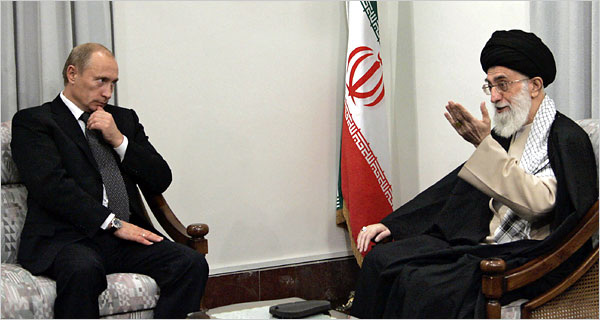Russia will start constructing two nuclear reactors in Iran next week, as Tehran seeks to reduce its reliance on oil and gas with 20 facilities over the coming years, an official said Tuesday.
The start of construction follows a historic deal between Iran and world powers in July that ends a decade-long standoff over Tehran’s nuclear programme.
And it comes a year after Tehran signed a contract with Moscow to construct two reactors at the existing Russian-built Bushehr power plant.
A series of agreements signed between the two countries last year foresees eventually increasing the total number of Russian-built reactors in the country to nine.
Work on the two facilities “will commence next week,” state television’s website quoted atomic energy agency spokesman Behrouz Kamalvandi as saying.
Iran plans to build 20 more nuclear plants in the future, including four in Bushehr.
The accord does not limit Iran’s development of civilian nuclear sites.
The two reactors will be financed by Iran, Sergei Kiriyenko, head of Russia’s state nuclear company Rosatom, said last year.
The two countries are allied in supporting Syrian President Bashar al-Assad against opposition and extremist groups, mainly ISIS.
And they plan to boost trade volume, as they signed several joint development documents last month during Russian President Vladimir Putin’s first visit to Iran in eight years.
-Economic ties-
On Monday, Iran’s Minister of Industry, Mining and Trade, Mohammad Reza Nematzade, and his Russian counterpart, Denis Manturov, opened an industrial exhibition in Tehran.
The three-day fair by Russian industrial holding Rostec State Corp, along with hundreds of business leaders, aims to introduce Russian industries to Iran, state television’s website reported.
Rostec owns 700 enterprises, organised into 14 holding companies, and nine of which are focused on the military.
Russia is “not afraid” of Western economic delegations trying to dominate Iranian markets after the lifting of sanctions, a Rostec official said Tuesday.
“Everyone is waiting for the sanctions to be lifted and every one wants to be the first” to enter Iran, international cooperation department chief Victor Kladov told AFP.
“We are afraid of nothing; we are certain of the quality of our products,” he said.
“Iran and Russia have a long history, and we are trusted partners for each other,” he added.
Fields of cooperation included transport, the auto industry, aviation, metallurgy, petrochemicals, oil and ship building.
Iranian engineers were examining the Sukhoi Superjet 100, in which the Russians traveled, Kladov said.
“As we are talking here Iranian technical specialists are examining it at the airport and they are flying over Tehran” to test it, Kladov said.
“If we can technically satisfy” Iran, a possible number “around 100 aircraft” would be sold to Iran, he added.
Rostec Helicopters was also in talks with Iran to sell new Russian medical helicopters. Rostec will also repair and upgrade a fleet of 50 Russian helicopters now operating in Iran.
Iran is to become a central maintenance centre in the region that services Russian-made aircraft from neighboring countries like Iraq, Afghanistan and Turkmenistan, he added.

